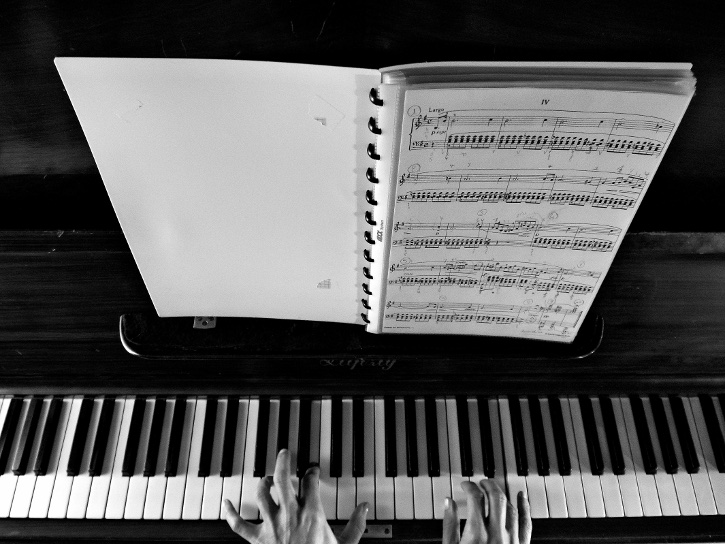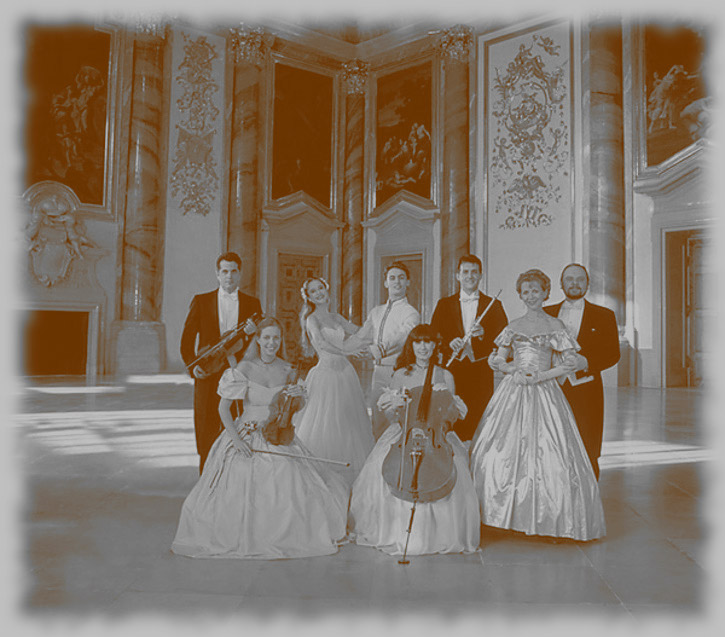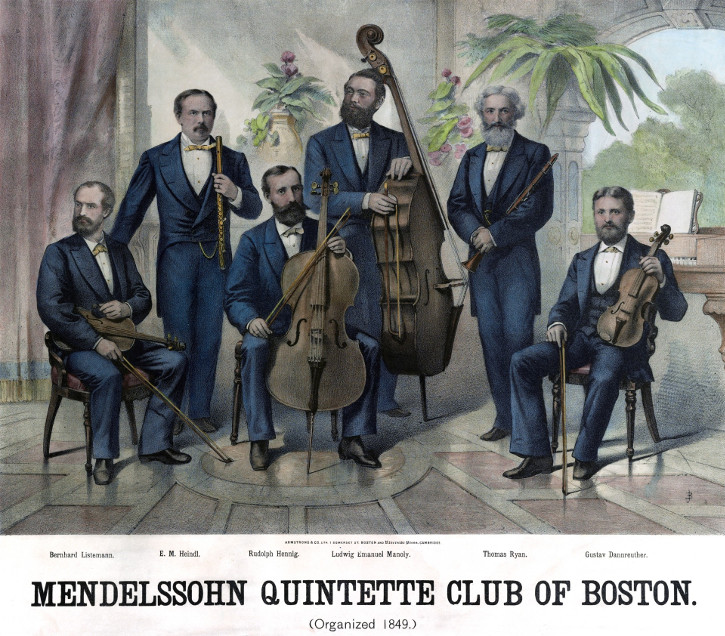The Vienna Residence Orchestra, which we have already covered extensively, is currently performing as an outstanding quintet in the Auersperg Palace. What does that mean and what are the arguments in favour? We have collected the information here for you …
Starting with the meaning of the number five in itself, we move on to its musical meaning, the quintet. The composition of five musicians can be found in the so-called “Viennese Cast” of the salon orchestra and in a modified form in the current quintet lineup of the Vienna Residence Orchestra. We’ll find out why this line-up was not chosen arbitrarily and the story behind it.
The meaning of the number five
From a purely pragmatic point of view, it’s easy to find the number five in a lot of places: each hand has 5 fingers, there are the five elements, the week has 5 working days, the 5 Olympic rings, one does not want to feel like the fifth wheel on the car – though this as a spare wheel is very important in an emergency. And then there is the numerology. This has a very unique view of the numbers
In numerology, every number has its meaning. In addition, there is the general meaning in numerology, the spiritual, there is obviously also a psychological meaning and of course there is a meaning in Feng Shui.
Dealing with numerology was new for me and the research itself was an “experience” and I learned a lot. The general meaning that is attributed to the number five reads like this: sense of responsibility, helping, healing, serving, meaning of life, religion, warmth, but also tactlessness, immobility and intolerance.
The Five in China
On a page on psychological numerology, the number five, as well as all odd numbers, is attributed to Yang quality. Very interesting. If you look for the mystical meaning of the number, you’ll find it in China:
In Chinese philosophy, medicine and magic, the number 5 occupies an outstanding position. It knows five colors, five senses, five virtues, five elements (in addition to fire, water, earth there is also wood and metal). The body organs are also divided into five groups. In fact, according to traditional Chinese beliefs, almost all human activities and all manifestations of nature are grouped into five categories.
(citation from homepage for psychological numerology)
In Chinese culture, and thus also in Feng Shui, numerology has a significance that should not be underestimated. Most people already know that the eight in China is an absolute lucky number, while many Chinese people try to avoid a four in the license plate. The five is (allegedly) ascribed the following absolutely positive qualities: 5 – harmony, balance of the five elements, creativeness.

The number five in music - the quintet
In music, the five is also important. More than you would think. Five musicians make a quintet. And a quintet is also a piece of music that was written for five performers. This comes from Latin, where the word “quintus” stands for “fifth”. Formerly, a distinction was made between the Instrumental Quintet and the Vocal Quintet, which was therefore called “Quintour”. Some other very common occupations developed as well:
The string quintet, the piano quintet and the clarinet quintet, woodwind or brass quintet.
From the Vienna Salon Orchestra to the quintet
The Vienna Salon Orchestra already found its mention in a previous article by us. In the article “The Vienna Residence Orchestra” we explained that the usually Vienna Residence Orchestra appears as a chamber orchestra, but sometimes also as a salon orchestra. According to the Austrian Academy of Sciences, the Vienna Salon Orchestra was originally an ensemble that played salon music in public. Over time, various forms have emerged, such as the so-called “Viennese Cast”. This typically formed around a violin obligate (the so-called standing violinist, who gives the tone in place of the conductor),then another violin, a cello, piano and flute (and sometimes percussion).
The Viennese peculiarity of the” standing violinist” is connected with J. Strauss’ father, who appeared with the violin in front of his S. (stands for Salon orchestra); after his unexpected death, J. Strauss took over a majority of the musicians in his own S., which now encompassed the 50 musicians and which he led despite the dimension as a standing violinist.
(citation from the lexicon of music of the Austrian Academy of Science)
picture of one variation of a Salon orchestra, here: The Mendelssohn Quintett, represented by six (?) musicians 🤔
The Vienna Residence Orchestra as Quintet
As a wintry “Special Edition”, the Vienna Residence Orchestra performs in the composition of a quintet, every year between January and March.
The composition of the quintet at the Vienna Residence Orchestra offers more than the ample salon orchestra. The musical direction has considered a lot to the design and argues as follows:
As you can already see, the quintet is based on the core line-up of the Vienna Salon Orchestra:
The standing violinist who plays the main voice, the second violin, who performs the typical Viennese rhythm.
The cello, which takes over both the minor parts and the bass function. The piano forms the harmonious carpet and the flute enriches the sound with its soft tone.
The composition as a quintet therefore offers something unique, it shows how five musical elements harmonize harmoniously with each other and can convincingly create a special flair. And here the come back to the Chinese meaning that is attributed to the five: the harmony and the creative power!
In addition, the repertoire of the quintet of the Vienna Residence Orchestra is much more interesting and rich than that of the salon orchestra and the color of the sound more exciting. A “normal” piano quintet is filled with piano (as the name implies) 1st violin, 2nd violin, viola and cello – that is a string quartet plus piano. The piano quintet of the Vienna Residence Orchestra, on the other hand, is occupied by piano, 1st violin, 2nd violin, flute and cello. So flute instead of viola. Why? The viola is important for the so-called “Nachschlag” (something like an off beat). These are also played by the second violin. In such a solo cast, therefore, it is not necessary to duplicate these “off beats”. The flute, however, is important in the arias either to support the vocal part or to play an accompanying phrase to the vocal part. It should be mentioned here that the voices are represented by internationally renowned soloists whose backgrounds can always be viewed on the homepage of the Vienna Residence Orchestra. After all, the quintet is still accompanied by a professional ballet and singing couple.
The Quintet at the Palais Auersperg
The halls, which are mainly used by the Vienna Residence Orchestra, are the Rosenkavaliersaal in the Palais Auersperg and the oval ballroom in the Palais Daun-Kinsky. Due to the special acoustics of both oval baroque halls, the quintet lineup is preferable to the salon orchestra line up because in the off-season the halls are usually not full. The latter may seem too obtrusively loud, while the former can bring out the timbres of the composition much better.
The specialty of the soloists of the Vienna Residence Orchestra in quintet occupation is to make the orchestral pieces sound as full as if they were interpreted by a large orchestra. Both the quality of the individual soloists on the piano, violins, flute and cello play a role, as does the partial use of the original arrangements of the composers.
The composers have adapted the orchestration of their works to the particular circumstances at their performance venues.
That is why the Vienna Residence Orchestra is especially proud to offer not only a historically original performance venue but also an original cast!

Visit one of the stunning quintet performances and let the art work on you. Book your tickets on viennatickets.com and experience the strength of the number five in the world of classical music!

photo by Gavin Whitner / MusicOomph.com

